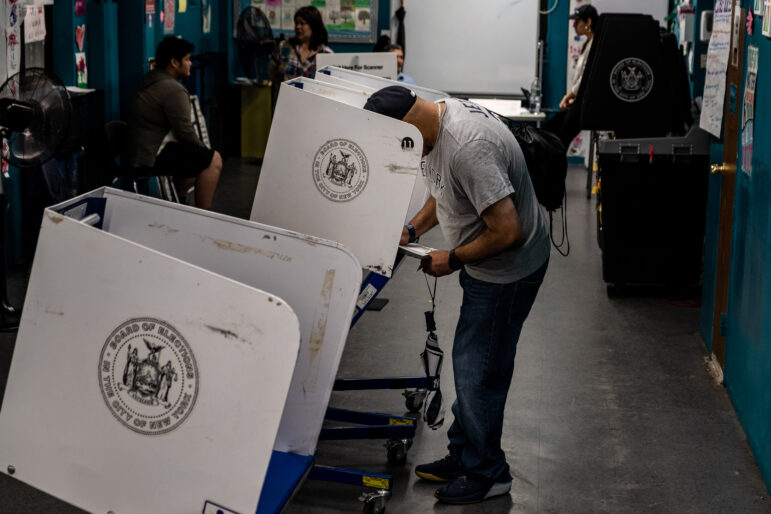
Opinion: The Mayor’s Ballot Questions Are a Quiet Power Grab
“In the midst of a five-count federal indictment, Mayor Adams is rushing to ask New Yorkers at the ballot for more power and less oversight.”
Adi Talwar
A voter in the Bronx filling out his ballot in 2023.
CityViews are readers’ opinions, not those of City Limits. Add your voice today!
In the complex ecosystem of New York City’s governance, the balance of power between the mayor’s office, City Council, and various agencies isn’t just a bureaucratic detail—it’s a fundamental component of how democracy functions at the municipal level.
Before receiving a federal indictment, Mayor Eric Adams proposed a series of revisions to the City Charter that could significantly alter this balance. These changes warrant a thorough and deliberate public examination, yet the process unfolding is shrouded in secrecy and neglects the necessary public participation.
First, let’s consider the speed of these developments. The Charter Revision Commission was formed on May 21 of this year, and by July 25, it had published its final report. Two months to propose significant changes to the city’s constitution—a document that underpins the governance of over eight million people—is alarmingly swift.
This compressed timeline leaves New Yorkers with only a few months to learn about, understand, and debate proposals that could have long-lasting impacts on the city’s democratic structures. Rushing such fundamental changes—especially as federal investigations into Mayor Adams’ administration escalate—undermines the very democratic principles the Charter is supposed to uphold.
One of the most concerning proposals is Proposition 4, which would impose additional procedural hurdles before the City Council can pass legislation related to public safety agencies, including the NYPD, the Fire Department, and the Department of Correction. By mandating extra hearings and reviews, this measure grants these agencies the power to stall, if not veto, reforms aimed at increasing accountability.
We know all too well the consequences of unchecked policing. Communities of color have borne the brunt of discriminatory practices, surveillance, and violence. Bills like Local Law 43 of 2024, requiring the NYPD to report on low-level encounters that often go unnoticed, are vital for collectively shaping community-police relations. But, as the Commission’s final report spells out, Proposition 4 aims to make such reforms significantly more difficult to enact in the future, tilting the balance of power away from elected representatives and toward the agencies themselves.
Proposition 2 raises additional concerns by proposing to expand the Department of Sanitation’s authority to penalize street vendors and unhoused New Yorkers under the guise of maintaining public cleanliness. Street vendors—many of whom are immigrants navigating a complex and often prohibitive permitting system—could face increased fines and enforcement actions. Unhoused individuals risk having their personal belongings confiscated during sweeps, a policy approach that criminalizes poverty rather than addressing its root causes.
We cannot police our way out of poverty. Expanding punitive measures only deepens the marginalization of already vulnerable communities. It’s a cruel policy that lacks both compassion and common sense.
Then there’s Proposition 3, which aims to centralize budgetary control within the mayor’s office by introducing new fiscal requirements before the City Council can pass legislation. This shift would diminish the Council’s legislative authority and weaken the Comptroller’s role in providing fiscal oversight.
The comptroller has rightly opposed these changes, recognizing that they erode the checks and balances essential for a functioning democracy. Shrinking legislative power doesn’t lead to efficient governance; it leads to corruption and mismanagement.
The composition of the Charter Revision Commission itself is a red flag. All 13 members were appointed by Mayor Adams, many of whom have close ties to his inner circle. While it’s within the mayor’s purview to make these appointments, this insular group does not represent the diversity of New York City nor the breadth of perspectives necessary for such a monumental task. It’s a move that sidelines dissenting voices and rubber-stamps the mayor’s agenda.
Amid these efforts, federal prosecutors have charged Mayor Adams with five counts of bribery, fraud, and soliciting illegal foreign campaign donations, all part of an ongoing corruption investigation. While the details are still emerging, the timing of the Charter Revision raises serious questions about its true motivations.
Since the indictment, calls for Mayor Adams’ resignation have steadily accumulated; yet Mr. Adams says he won’t resign, and the Revision remains on the ballot. New Yorkers must reject it for what it represents: a desperate attempt to centralize power within the first mayoral administration in modern New York City history to face criminal charges, rather than a genuine effort to improve governance.
Issues like public safety, homelessness, and budgetary constraints are undeniably pressing. However, addressing them through mechanisms that concentrate power and reduce oversight will lead to greater bureaucratic burdens at the expense of long-term democratic health.
Before these proposals appear on the ballot, New Yorkers deserve a more extended period for discussion and understanding. Civic organizations, community leaders, and everyday citizens should have the opportunity to weigh in, ask questions, and suggest modifications. Even though the process seeks to inundate City Council with unending bureaucracies, it itself bypasses the prescribed standard. Democracy doesn’t function well in a vacuum or on a tight deadline imposed from above.
In the end, the question isn’t merely about the specific content of these revisions but about the kind of governance New Yorkers want for their city. Do we want a system that values speed over deliberation, concentration of power over checks and balances, and punitive measures over holistic solutions? Or do we aspire to a more inclusive, transparent, and accountable governance structure that genuinely reflects the diverse voices of the city?
Our city has a proud history of activism and standing up against injustice. Now is the time to honor that legacy. Let’s reject these dangerous propositions and work together to build a New York that upholds democracy, protects civil rights, and respects the voices of all communities, not just those in the mayor’s inner circle.
Darío Maestro is a senior legal fellow at the Surveillance Technology Oversight Project (S.T.O.P.).
The post Opinion: The Mayor’s Ballot Questions Are a Quiet Power Grab appeared first on City Limits.

